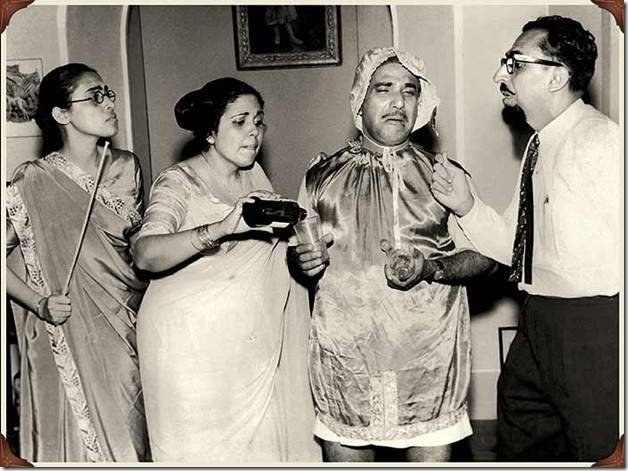Adi Pherozeshah Marzban, also known as Adi Marzban (1914–1987) was a doyen of Parsi theatre in the post-independent period. Though he has directed and stage plays in English and Gujarati languages in the early 1950s, he later fully switched over to Parsi theatre, and played a magnificent role in revolutionizing, modernizing and popularising it. Padma Shri in 1964 and Sangeet Natak Akademi Award in 1970 are the major honours received by him. He had experience in journalism, and most of his plays were socially relevant. He gave preference to comedy in his plays.
Article by Sandy | My Words and Thoughts
Adi Marzban’s early days and his career as a journalist and editor
Adi Marzban was born into a Gujarati Parsi family in Mumbai of intellectuals and artists. His father Pherozeshah Jehangir Marzban was a playwright and theatre personality, and Adi also got interested in the same field. It was during his graduation days at Elphinstone College when he started seriously thinking about a career in the field of theatre. His meeting with Pesi Khandavala in those days proved to be a major turning point of his career, and later the duo collaborated for many works together. Pesi Khandavala later served as his manager during his active years in Parsi theatre.
He was introduced to active theatre in the early 1950s
Initially he worked as a publicity officer for Western India Theatres, followed by a journalism job and he left that one too. He was associated with his family newspaper – Jam-e-Jamshed, where he played the role of an editor. In the early 1950s, he started writing plays in Gujarati and English. Then he moved to US and studied theatre at Pasadena Playhouse. Soon after he returned, he joined Kala Kendra at Bharatiya Vidya Bhavan after which he turned busy with his plays.
He wrote and directed Parsi play – Piroja Bhavan in 1954 for Kala Kendra at Bharatiya Vidya Bhavan and its success prompted him to concentrate on Parsi theatre. It was his first collaboration with Pesi Khandavala, whom he met during his college days. Breaking stereotypes of historic and family melodramas, he concentrated on comedy plays based on socially relevant subjects, which gave him immense popularity and success. Ardhi Raate Aafat – a thriller was one of his early successful works, followed by a series of notable plays. He took Parsi theatre to new heights in the 1950s and 1960s.
Most of his plays were farces based on socially relevant subjects
Within a short span he gave a new look to Parsi theatre, and he has been credited to modernizing it. He has been active in many theatre organizations of Bombay circle including Indian People’s Theatre Association, Theatre Group, Amateur Dramatic Circle and many more. Katariyun Gap, Ardhi Rate Ahat, Kaka Thaya Vanka, Mota Dil na Bava etc are some of his most successful plays. He successfully adapted a few foreign plays also.
Adi Marzban – Some interesting and less-known facts
1. He was a trained musician who was an expert in keyboards, guitar, ukulele, clarinet and piano. He was also an expert of magic, ventriloquism and Western dance.
2. He was a successor of Fardunjee Marzban, the founder of prominent Gujarati magazines – Jam-e-Jamshed and Bombay Samachar – the oldest continuously published newspaper in India, now known as Mumbai Samachar.
3. His wife Silla, a TV personality and a writer.
4. This talented artist used to improvise the dialogues in plays during rehearsals, and his plays were known for the scene and light design as well as music.
5. He had sense of humour and was known for his comic timing. During his younger days, he wrote comic columns for Gupsup magazine in the 1930s.
6. He was the guru of some of the famous Parsi theatre personalities like Homi Tawadia, Phiroz Antia, Burjor Patel and Ruby Patel.
7. He has scripted two less-known feature films – On Wings of Fire and Carnival Queen.



